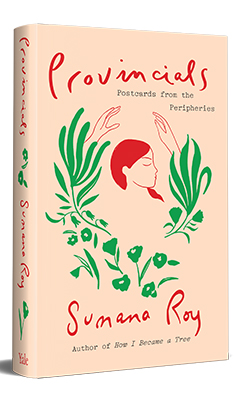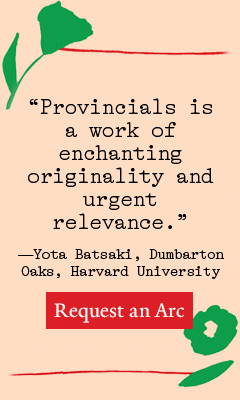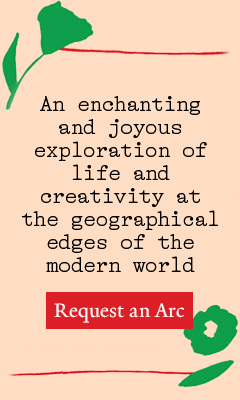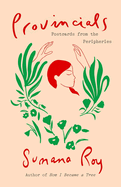Provincials: Postcards from the Peripheries
by Sumana Roy
In Provincials: Postcards from the Peripheries, Sumana Roy takes a contemplative literary stroll back through time and across continents, pondering the exceptional contributions to literature by writers whose rural and small-town upbringings were presumed to hold them at an intellectual disadvantage from their cosmopolitan, more sophisticated peers. While collecting these "unaired histories," she returns to her own childhood in Siliguri, a small West Bengal town nestled in the foothills of the Himalayas, and savors the unexpected benefits of a countrified life far from the temptations of the metropolis. Nestled within chapters titled "Postcards," "Place," "Pedigree," "Poetic," and "Pran" (the Sanskrit word for breath and life), are empirical gems on the spiritual climate of small-town life, one that affords its writers an altogether distinct energy and perspective on humanity and the natural world.
Roy (How I Became a Tree; My Mother's Lover and Other Stories) is a close observer of trees and plants. She teaches creative writing at Ashoka University in Sonipat, India, where she is also working to create a first-of-its-kind living archive of writing and art on plant life. She became alert to the concept of provinciality when a colleague referred to her as a "provincial." Unnerved by the use of a word she hadn't associated with herself, she was confused at the reference. Why was it a derogatory term? Until then, Roy had never considered herself any lesser than her city-dwelling contemporaries. That revelatory moment ignited in her a deep desire to connect with scholarly ancestors who, in their own eras, were spoken of condescendingly as provincials. What she discovered was a trove of talented global writers who were underestimated, just like she was, and yet who contributed remarkable bodies of work to the literary canon. Surveying the splendid imaginings of the country-dwelling Brontë sisters; the skillful, small-town aesthetic of Indian writer Rabindranath Tagore; and the "unlettered but philosophically minded" Portuguese writer Fernando Pessoa's contribution to his country's literary heritage, Roy was thrilled to recognize in her literary predecessors a resourcefulness she summarizes thus: "When 'nothing happens,' invention happens."
Invention was essential to the worldly, cosmopolitan flair the author and her classmates yearned to cultivate during their boarding school years in Calcutta. Inspired by the Hallmark-style cards she eagerly pored over in stationary shops, Roy became the designated letter writer for peers with boyfriends to impress, fictionalizing their lives with romantic flourishes in English, the ultimate language of sophistication. It is here, early in the first chapter of the book, that one first encounters the delightful depths of Roy's brilliant yet understated humor, her ability to translate everyday life experiences into memorable anecdotes whose sparkling rendition draws readers in and makes them laugh. That letter-writing provincial hoping to capture a potential lover's attention, she observes, understood the "Viagra-like role" of English as the language of lovemaking, even if the recipient could not read English.
For a post-colonial provincial like herself who is fluent in the English language, there was still the hurdle of pronunciation, and she writes feelingly about the linguistic perils inherent in speaking a language one rarely heard spoken aloud. With a horror of mispronouncing words, Roy tries to learn from YouTube, but the sounds leave her immediately. Accepting that it's difficult to change "the habit of the tongue," she forbids herself from saying certain words out loud in public for fear of embarrassment.
The chapter "Pedigree" opens with a 16th-century provincial writer who cared not a whit what others thought of him. William Shakespeare, the son of a glove maker, lacked a proper education in Latin and Greek, the foundational languages of European culture. Born in the small town of Stratford-upon-Avon in central England, he was a social and intellectual outsider when he arrived in London, an "upstart crow" according to fellow playwright Robert Greene, who accused Shakespeare of borrowing the "feathers" of his Oxbridge-educated peers. Without the benefits of class, education and place, Shakespeare adopted out of necessity an "ad hoc ethic, of letting the impress of whatever comes his way annotate his learning." Roy writes admiringly of his autodidactic tendencies, a skill set essential for the provincial to succeed in the metropolis. It was the same for the "bearded upstart" D.H. Lawrence, a boy from Nottingham, the son of a miner and a self-taught writer who found much success with, among other works, Lady Chatterley's Lover. The time period covered by Provincials extends well into the present day, with the contemporary voices of writer Amitav Ghosh and director Greta Gerwig, among others, included in Roy's narrative.
Provincials pays particular homage to Rabindranath Tagore, a writer who, despite being born in the city of Calcutta, spent his most impressionable years in small towns. In his work, Tagore champions the rural life, marveling at the way humans share their surroundings with "the elements, plants and animals," and associating it with a sense of freedom and "deep peace" unavailable to city dwellers. Even the deprivation of provincial life, where mail and newspapers rarely arrived on time, was essential to his creativity.
With praises already sung by writers like T.S. Eliot about the cosmopolitan life and the classics it nurtured, Provincials seeks to inaugurate an ongoing literary conversation about those who "lurk at the periphery" of city life. Throughout this insightful, impressively researched book, Roy holds the word "provincial" up to the light, examining it from multiple angles and merging poetic imagery of the natural world with an honest examination of her own heart. --Shahina Piyarali








